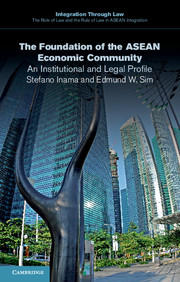5 - Conclusions
Published online by Cambridge University Press: 05 May 2015
Summary
A fundamental premise of this book is that the ASEAN member states should give greater priority in the AEC integration process to the development of the single production base over the single market. If the AEC is to have an immediate material effect on the citizens of ASEAN, it would make more sense to build the production base, then attract foreign investors who will hire ASEAN citizens and put funds into the local economy. Given the disparity in economic development and market sizes, giving priority to development of the single market would mean a much longer roll-out process with less economic impact on the region. Conversely, emphasizing development of the single production base will allow ASEAN policymakers to husband scarce political, economic, and human resources on a more achievable, modest goal.
Hence the authors have posited that attracting investors to a single production base in ASEAN requires improved monitoring, administration, and implementation of AEC measures. This is crucial as the AEC moves beyond simply dealing with the traditional border issues of customs and into non-tariff barriers that apply after the goods, investments, capital, and people have crossed the border. Dealing with post-entry issues requires these improvements, which go beyond the current capabilities of the ASEAN Secretariat. These issues are exacerbated because the AEC does not incorporate a customs union; the preferential trading arrangements instead require additional measures which are not necessary in a customs union. Improvements in these aspects of the AEC are even more imperative for formation of a single market, which will involve even greater scrutiny of ASEAN member states' policies with regard to inward flows of goods, investments, capital, and people. Such improvements, in the authors' view, require predictability and clarity in the operations of the ASEAN institutions.
However, the question must be raised whether foreign investors actually value or want predictability and clarity in ASEAN?
- Type
- Chapter
- Information
- The Foundation of the ASEAN Economic CommunityAn Institutional and Legal Profile, pp. 190 - 196Publisher: Cambridge University PressPrint publication year: 2015



